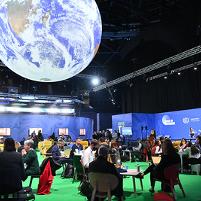This week sees the endgame of the COP26 climate conference in Glasgow. Since 1995, the Conference of the Parties (COP) to the United Nations Framework Convention on Climate Change (UNFCCC) takes place once a year. This year, States meet for the 26th time in Glasgow for COP26. While there has been a significant increase in rhetoric since Paris in 2015, a new and sobering assessment from the Climate Action Tracker (CAT), the world’s most respected climate analysis coalition, places the future in cold reality – with a rise of 2.4C due to the outcome of countries stated short term goals. At the same time the week has seen major speeches by national Science Ministers. The UK’s Sir Patrick Valence among them. While Sir Patrick also took a cautious stance, he did feel that the current climate emergency might be averted for three reasons: the opportunities provided by new technologies, the commitments made at COP26, and crucially ..”we’ve got a whole generation that’s absolutely determined” to tackle climate change.
So what about the role of youth – how do they fit in and can they make a difference. To look at this I co-created the platform Youth Delegate Search to assess some of the views and participation, as well as the history of youth movements and climate change.
To prepare for COP26, there was a conference in Milan in September, the Pre-COP26, organised under the partnership of Italy and the United Kingdom (UK). As part of Pre-COP26, States representatives met with almost 400 Youth Delegates, aged 15 to 29 years, from 186 countries. The “Youth4Climate 2021: Driving Ambition” event gave Youth Delegates the opportunity to speak up, collaborate, and create proposals against the climate crisis. At first glance, this appeared like a promising event, capable of enhancing youth participation on a global level. However, there are reasons to be wary.
On prestigious events and guilt-free planes
One of the many arguments for youth participation stems from the fact that young people are expected to face more extreme weather events “across their lifetimes compared with older generations”. This does not mean that older people are not affected, as rightly pointed out by initiatives such as Climate Seniors Association. Young people are however distinctly, if not solely affected by the climate crisis.
For some the Youth Delegation was a success. As a Youth Delegate from El Salvador wrote on Twitter “[i]t was a great honor” to represent her country at “such a prestigius [sic] event”. Another Youth Delegate from Palestine tweeted “we never been so close to stopping the #climate change as we are now, there is the world before #Youth4Climate, & the world after it. The event was the center of the world”.
Similarly, the British Prime Minster said confidently that if young people just continue to speak up then “we can turn this thing around”, promising that they will “inhabit a world where electric cars glide silently down your streets from California to Cape Town; emission-free, guilt-free jet zero planes will fly overhead; and all of us will be able to deal with whatever the climate throws at us”. The Prime Minister of Italy shared some similar content remarks, stating: “[Y]our pressure is very welcome. We need to be whipped into action. Your mobilization has been powerful, and rest assured: we are listening.” And the President of COP26 declared: “This is the start. This cannot be the last time that we get young people together and have this kind of discussion. (…) This really cannot be a one off.”
Fragmentation, legitimation, narrative, tokenism – Four points of critique
However, behind the joy and rhetoric, are real concerns.
Firstly there are already Youth Delegates who were elected on a national level, Youth Delegates to the UN General Assembly who were not even considered for the conference. There is thus the real risk of fragmentation of global youth participation where Youth Delegates are unaware of their many national counterparts, in which effective coordination is lacking, and where Youth Delegates from the same country push for conflicting agendas.
Secondly, did the election process confer any democratic legitimation upon the Youth Delegates attending the Youth4Climate meeting? Young people could apply online via Submittable. Their applications were then processed by the Office of the UN Secretary-General’s Envoy on Youth. This means, that young people nationally did not have the possibility to vote (directly or indirectly) or influence the election of “their” delegate.
Thirdly, the narrative of the Youth4Climate conference inferred that the youth movement commenced just 2 years ago, ignoring the early environmental movements in the 1970s which consisted of activists who “were largely young and young adults, typically students”. Indeed these are now todays older adults, and many of them are still involved.
Besides that, every year since 2005, a Conference of Youth (COY) precedes a COP. COY is the meeting of YOUNGO, the official youth constituency of the UNFCCC, consisting of 200 youth-non-governmental organisations (see also here). The current narrative thus pays no attention to the long history and struggle of global youth participation in environmental issues.
And finally, both Prime Ministers of Italy and UK seem to be in favour of youth participation, claiming that they “need to be whipped into action”, that young people should keep on going. According to the platform Youth Delegate Search, both Italy and the UK sent in the period of 1982 to 2015 only in one year Youth Delegates to the UN General Assembly. Compare this to Norway which sends Youth Delegates every year since 1971. Measured against their action, statements like those of the Prime Ministers seriously feed the impression that the Youth4Climate meeting was not about sincere youth participation but about opportunistic tokenism.
Greta Thunberg said in her speech in Milan: “We can no longer let the people in power decide what hope is. Hope is not passive. Hope is not blah blah blah.” In the same vein, Elizabeth Wathuti, Youth Delegate of Kenya at the Youth4Climate meeting, reflected on Milan in an interview I conducted: “We felt so many times as though we were being ignored or not being listened to at all.” Many young people realise that youth participation remains what it has always been: a struggle.
If questions of fragmentation and democratic legitimation are ignored, while flawed narratives in support of tokenism are disseminated, there is a risk that events organised in the name of youth participation turn out to be tools against their purported aim. All this is nothing new. This is not the start.
About the Author
Julian Hettihewa is a Visiting Student at the Oxford Institute of Population Ageing. He is based as a Doctoral Student and Research Assistant at the Institute for Public International Law, University of Bonn, where he also teaches German constitutional law.
Opinions of the blogger is their own and not endorsed by the Institute
Comments Welcome: We welcome your comments on this or any of the Institute's blog posts. Please feel free to email comments to be posted on your behalf to administrator@ageing.ox.ac.uk or use the Disqus facility linked below.













